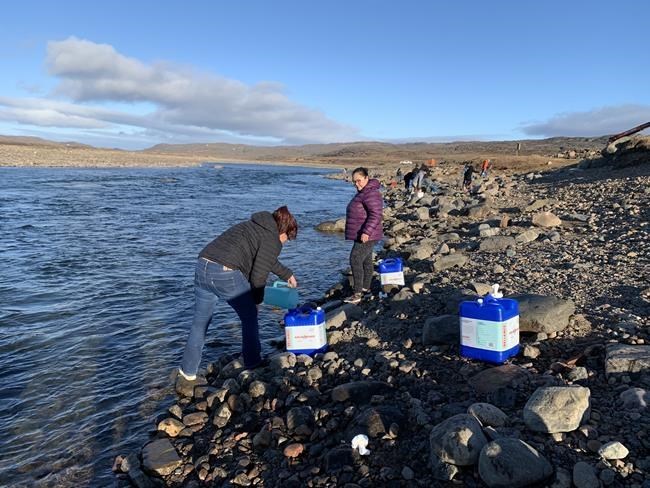IQALUIT, Nunavut — Iqaluit residents filled blue plastic jugs and bottles Wednesday in the ice-cold Sylvia Grinnell River just outside the city after they were told tap water in the Nunavut capital may be unsafe to drink.
The city of about 8,000 people declared a local state of emergency Tuesday night saying its water supply could contain fuel.
Iqaluit mayor Kenny Bell said Wednesday the Nunavut government plans to fly in 80,000 litres of water to the city over three days.
Some residents complained last week on social media about a fuel smell in the water, but he said the water had gone through daily testing and it came back clean.
Then, on Tuesday, Bell said city staff opened a "typically-sealed" tank in the water treatment plant that holds treated water before it gets distributed throughout the city.
"There was a strong smell of petroleum products," Bell said.
If the water in that location is affected, he said, it would mean all of the city's water would be affected.
"We knew something was wrong," said Bell. "We're not 100 per cent sure if this is it but it most likely is based on the amount of smell in the tank."
City officials said water samples have been sent to a lab in Southern Canada, but noted it will take about five business days to get those results back.
In the meantime, the mayor said the city is cleaning the tank and inspecting its walls to look for cracks.
"We don't how it got there, why it's there, what it is," Bell said of the smell.
City water trucks were also pumping water from the river late Tuesday night and early Wednesday morning.
The city made treated water available to residents at a water filling station, but it still needs to be boiled.
Andrew Tagak Jr., who had several water jugs to fill at the station, said he's been able to get enough water for himself and the three other people in his household.
"As long as I know it's fresh, I'm happy," Tagak Jr. told The Canadian Press.
He said he noticed a smell in his water last week but didn't think much about it.
"I didn't know it was going to be petroleum hydrocarbons. I felt upset ... but now we got the water and maybe now we can move on."
Katie Hughes, another resident, said she thought there was a fuel smell in her water for the last week and a half.
"I feel like the city should have been doing tests two weeks ago and it's their job to keep us safe," Hughes said.
Christine Karkow said she was irritated when she learned there might be something wrong with the water.
"There has been a lot of back and forth in the last week or so about whether it's safe or not," Karkow said.
The mayor said the city has an outside consulting firm looking into the problem.
Bell said he understands the fear and frustration many residents are feeling.
"I was telling people what the tests were saying. I was drinking the water. My kids were drinking the water," he said.
Schools across Iqaluit were closed Wednesday and government offices shut down by early afternoon because of the water problem.
Both Arctic Ventures and Northmart, the city's two major grocery stores, were out of bottled water by midday Wednesday. Both stores also sold out of plastic jugs.
In Iqaluit, like all of Nunavut's communities, bottled water already sells at a high cost.
For example, a 40-pack of 500 ml bottles of water at Northmart typically sells for $48.79 before tax, while a 24-pack of water is $27.99.
This report by The Canadian Press was first published Oct. 13, 2021.
___
This story was produced with the financial assistance of the Facebook and Canadian Press News Fellowship.
Emma Tranter, The Canadian Press



